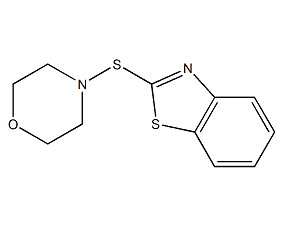
Structural formula
| Business number | 02MF |
|---|---|
| Molecular formula | C11H12N2OS2O |
| Molecular weight | 252.36 |
| label |
2-(4-morpholinylthio)benzothiazole; N-oxydiethylene-2-benzothiazolesulfenamide; 2-morpholinylthiobenzothiazole, 2 – (4 – Morpholine thio) benzothiazole, N-oxide diethylideneethylene -2 – benzothiazolyl sulfenamide, 2 – morpholinyl benzothiazole, Rubber additives |
Numbering system
CAS number:102-77-2
MDL number:MFCD00022870
EINECS number:203-052-4
RTECS number:DL5950000
BRN number:None
PubChem ID:None
Physical property data
1. Properties: light yellow to brown flaky crystals
2. Relative density (g/mL, 25℃): 1.34-1.40
3. Relative vapor density ( g/mL, air=1): Undetermined
4. Melting point (ºC): 80-90
5. Boiling point (ºC, normal pressure): Undetermined
6. Boiling point (ºC, mmHg): Undetermined
7. Refractive index: Undetermined
8. Flash point (ºC): Undetermined
9. Specific rotation (º): Undetermined
10. Autoignition point or ignition temperature (ºC): Undetermined
11. Vapor pressure (mmHg, 20ºC ): Undetermined
12. Saturated vapor pressure (kPa, ºC): Undetermined
13. Heat of combustion (KJ/mol): Undetermined
14. Critical temperature (ºC): Undetermined
15. Critical pressure (KPa): Undetermined
16. Log value of oil-water (octanol/water) partition coefficient: Undetermined Determined
17. Explosion upper limit (%, V/V): Undetermined
18. Explosion lower limit (%, V/V): Undetermined
19. Solubility: Easily soluble in methylene chloride and acetone, soluble in benzene, carbon tetrachloride, ethyl acetate, ethanol, slightly soluble in gasoline, insoluble in water.
Toxicological data
1. Skin / Eye irritation: Standard Dresser test: rabbit skin contact, 500mg/24HREACTION SEVERITY , slight reaction; Standard Dresser test: Rabbit eye contact, 100mg/:宋体;color:#333333;FONT-SIZE: 9pt”>6. Mutagenicity:DNARepair test: bacteria–E. coli ,10μg/plate; Mutant microbial test: mouse lymphocytes, 15 mg/L; “> >Morphological transformation test: mouse embryo, 200μg /L; Mutation assay in mammalian somatic cells: mouse lymphocytes,10mg/L;
Ecological data
Slightly harmful to water bodies.
Molecular structure data
1. Molar refractive index: 70.36
2. Molar volume (cm3/mol): 180.7
3. Isotonic specific volume (90.2K ): 518.7
4. Surface tension (dyne/cm): 67.8
5. Dielectric constant:
6. Dipole moment (10-24cm3):
7. Polarizability: 27.89
Compute chemical data
1. Reference value for hydrophobic parameter calculation (XlogP): 2.7
2. Number of hydrogen bond donors: 0
3. Number of hydrogen bond acceptors: 5
4. Number of rotatable chemical bonds: 2
5. Number of tautomers: none
6. Topological molecule polar surface area 78.9
7. Number of heavy atoms: 16
8. Surface charge: 0
9. Complexity: 236
10. Number of isotope atoms: 0
11. Determine the number of atomic stereocenters: 0
12. Uncertain number of atomic stereocenters: 0
13. Determine the number of chemical bond stereocenters: 0
14. Number of uncertain chemical bond stereocenters: 0
15. Number of covalent bond units: 1
Properties and stability
Easily soluble in methylene chloride, acetone, soluble in benzene, carbon tetrachloride, ethyl acetate, ethanol, slightly soluble in gasoline, insoluble in water. Gradually decomposes when exposed to heat. This product is non-toxic.
Storage method
Should be stored at low temperature. The shelf life is 6 months.
Synthesis method
Add accelerator M into the morpholine aqueous solution, add sodium hypochlorite dropwise at 23-56°C to perform an oxidation reaction to obtain a semi-finished product, and then filter, wash, and dry to obtain the finished product. Raw material consumption (kg/t) accelerator M (97%) 840 morpholine (60%) 700 chlorine (95%) 478 caustic soda (40%) 4251 sulfuric acid (95%) 1170

Purpose
It is used as a post-effect rapid vulcanization accelerator with long scorching time and good operation safety. Easy to disperse, no blooming, slight discoloration, especially suitable for natural rubber and synthetic rubber containing alkaline furnace black. The vulcanized rubber has excellent physical and aging properties. Mainly used in the manufacture of tires, inner tubes, rubber shoes, tapes, backing rubber for retreading tires, etc.
The finished product is then filtered, washed and dried to obtain the finished product. Raw material consumption (kg/t) accelerator M (97%) 840 morpholine (60%) 700 chlorine (95%) 478 caustic soda (40%) 4251 sulfuric acid (95%) 1170

Purpose
It is used as a post-effect rapid vulcanization accelerator with long scorching time and good operation safety. Easy to disperse, no blooming, slight discoloration, especially suitable for natural rubber and synthetic rubber containing alkaline furnace black. The vulcanized rubber has excellent physical and aging properties. Mainly used in the manufacture of tires, inner tubes, rubber shoes, tapes, backing rubber for retreading tires, etc.

 微信扫一扫打赏
微信扫一扫打赏

